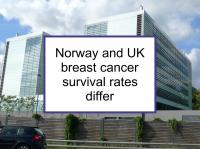A new study has reported that women treated for breast cancer in England are less likely to survive than those treated in Norway, mainly as a result of higher mortality during the first year after diagnosis. Breast cancer survival statistics are known to be worse in the UK than in some other European countries.
The study was designed to investigate the reasons for differences in survival between breast cancer patients in England and Norway according to age at diagnosis and time elapsed since diagnosis.
The study included 303,648 English and 24,919 Norwegian breast cancer patients diagnosed between 1996 and 2004. The probabilities of death from breast cancer and death from all other causes were estimated in order to calculate the number of potentially avoidable deaths.
Breast cancer patients in England were found to have poorer survival compared to Norwegian patients for all ages at diagnosis. The difference in survival increased with age at diagnosis. Much of the difference between the outcomes of women in the two countries was a result of higher excess mortality in England during the first few months after diagnosis.
As would be expected, old women had a higher likelihood of death than younger women. However, women diagnosed when old were significantly more likely to die of breast cancer in England than in Norway.
A woman in England aged 85 at diagnosis had a 35% probability of dying of cancer and 32% probability of dying of other causes during the first five years following diagnosis. The comparable probabilities in Norway were 26% and 35%. By eight years after diagnosis, there were an estimated 1,488 “avoidable” breast cancer-specific deaths in the English study population. The authors conclude that lower breast cancer survival in England is mainly a result of higher mortality during the first year after diagnosis.
Avoid delays in treatment
While ideally there will be someone on a patient's cancer treatment team whose job it is to guide her through the process of obtaining appropriate and timely care, in practice this seldom occurs. Most women are introduced to cancer treatment through a radiologist or breast surgeon, who perform the initial biopsy and/or breast surgery.
Patients should obtain a referral to a radiation oncologist (if radiotherapy is likely) and a medical oncologist (who will order chemotherapy and/or endocrine treatment based on the pathology results of the tissue removed during surgery) immediately and make an appointment as soon as possible (this could take weeks to set up).
An optimal amount of time between surgery and additional treatment is three to four weeks (which allows time for recovery from the surgery) — two months is too long and three months is unacceptable.
Delays in care sometimes occur because of a detour into alternative cancer treatment such as an attempt to cure the cancer with a specialized diet or supplements. There is no known diet, supplement or combination or diet and supplements that can cure breast cancer. Diet is most beneficial in helping to prevent breast cancer or its recurrence.
In fact, there is some evidence that eating very little during chemotherapy can enhance its effectiveness. Some supplements might actually promote cancer growth or interfere with treatment. (Please see our articles on what to eat during doxorubicin or paclitaxel chemotherapy.)
Please see our article on breast cancer in old age.
